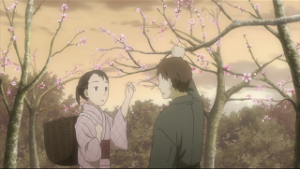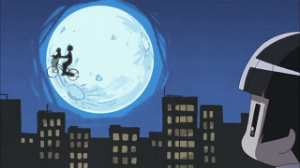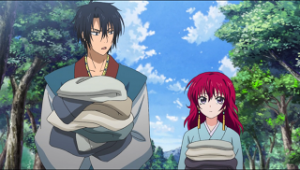 Celestial Method #4 – Celestial Method has something important to say with this episode, and that something is that it has picked a pace and it’s going to stick with it. There will be no quick infodumps on its watch. Instead, we’re in for a gradual unspooling of the events each character has lived and how their feelings about the flying saucer have developed.
Celestial Method #4 – Celestial Method has something important to say with this episode, and that something is that it has picked a pace and it’s going to stick with it. There will be no quick infodumps on its watch. Instead, we’re in for a gradual unspooling of the events each character has lived and how their feelings about the flying saucer have developed.
Good thing it’s got some well-rounded characters worth unspooling. We finally get a proper introduction to Sōta, the only one of the former friends who stayed behind who isn’t suffering a serious case of drama. Indeed, he’s the only one really thinking about the future, while everyone else is still smarting over the past.
Yūzuki in particular is upset over something more serious than just the busloads of tourists and the loss of the fireworks. She blames the appearance of the saucer for the loss of someone close to her. Which would be an interesting coincidence as it’s already been hinted that Nonoka’s mother also died some years ago. Of course, if that’s the case, it’s never a coincidence, and there may be a darker side to Noel’s presence after all.
 Mushishi #12 – The mushi have odd ecological niches sometimes, but they make sense in the context of their ecosystem. I can’t quite figure out the evolutionary advantage of sending bees into a time loop, though. The only possible reason the kairō exists is that the author wanted to do a story about time and old age.
Mushishi #12 – The mushi have odd ecological niches sometimes, but they make sense in the context of their ecosystem. I can’t quite figure out the evolutionary advantage of sending bees into a time loop, though. The only possible reason the kairō exists is that the author wanted to do a story about time and old age.
It is generally found that young people regret things they have done, whereas old people regret things they haven’t done. Thus what Kaoru wants more than anything, after living three or more lifetimes, is to move forward and have new experiences again. He’s made mistakes in the past, but he’s accepted that it’s the past, and he made the best of where his life went after that.
I like to compare Mushishi to The Twilight Zone, and that was a particularly Twilight Zone ending.
 Gugure! Kokkuri-san #4 – With Inugami settled into the household, it’s time to introduce the third member of the triumvirate. Shigaraki is a classic trickster tanuki, cultivating the persona of the lovable rogue (or trying to) so that he can be the most bastardy bastard he can be. Which is apparently pretty damn bastardy, if he can supply an entire orphanage with children. Kohina and Kokkuri are now up against two world-class homewreckers. Hilarity should ensue! Hopefully. I didn’t feel Shigaraki’s introduction was really up to the standard of the first three episodes.
Gugure! Kokkuri-san #4 – With Inugami settled into the household, it’s time to introduce the third member of the triumvirate. Shigaraki is a classic trickster tanuki, cultivating the persona of the lovable rogue (or trying to) so that he can be the most bastardy bastard he can be. Which is apparently pretty damn bastardy, if he can supply an entire orphanage with children. Kohina and Kokkuri are now up against two world-class homewreckers. Hilarity should ensue! Hopefully. I didn’t feel Shigaraki’s introduction was really up to the standard of the first three episodes.
Then it’s time for a stint of helicopter parenting and the discovery that the most popular boy in Kohina’s class is a bundle of well-known sf references in the shape of a Gray. And that some movies are so popular that even minor deities in nearly abandoned shrines have seen them.
Annoying translation note: The Japanese term being translated as “sci-fi”, is, in fact, “sf” (esu-efu). However, subtitlers insist on using “sci-fi” in the apparent belief that viewers will never figure out this arcane abbreviation. We still have work to do, fandom.
 Yona of the Dawn #4 – Yona gets a chance to catch her breath and heal up, and quickly regains her spirit as well. No wallowing in misery for her; she’s ready to try and pull her weight as best she can. It continues to be totally believable that she will easily grow into the outlaw leader we had a glimpse of at the beginning of the series.
Yona of the Dawn #4 – Yona gets a chance to catch her breath and heal up, and quickly regains her spirit as well. No wallowing in misery for her; she’s ready to try and pull her weight as best she can. It continues to be totally believable that she will easily grow into the outlaw leader we had a glimpse of at the beginning of the series.
In the meantime, everyone has to knuckle under to Soo-won. Hak makes the only decision he can make (well, the only mature one available in a story that doesn’t feel like pulling out a deus ex machina, anyway), choosing to put the survival of his tribe ahead of futile gestures of righteousness.
I have one complaint about this episode, and it’s nothing to do with the characters or story. It’s that someone is turning up the music a bit too far in the dramatic moments.








